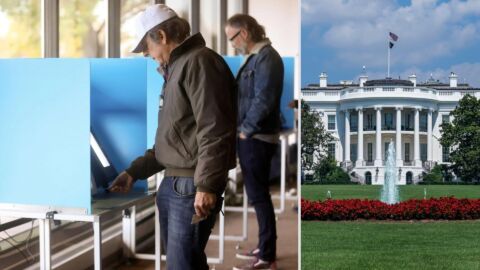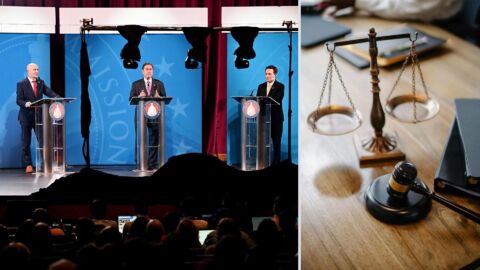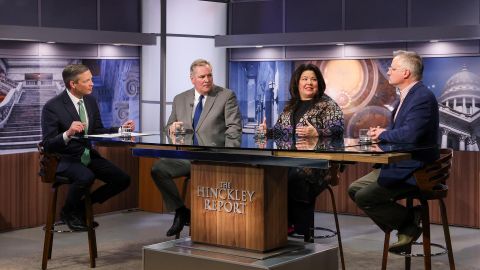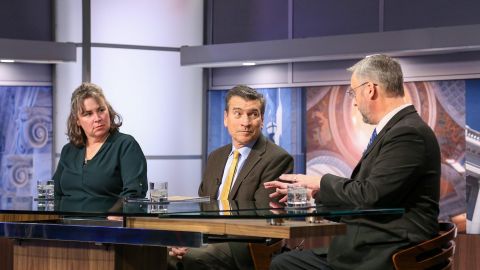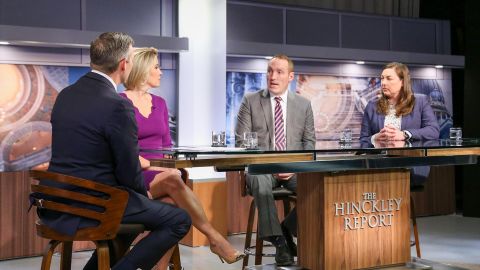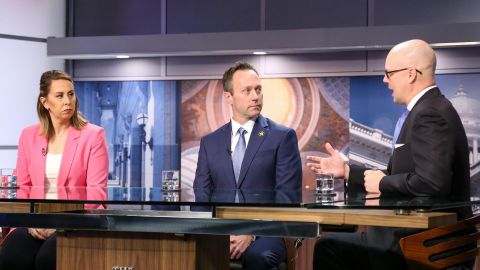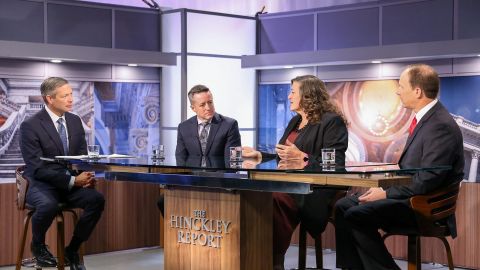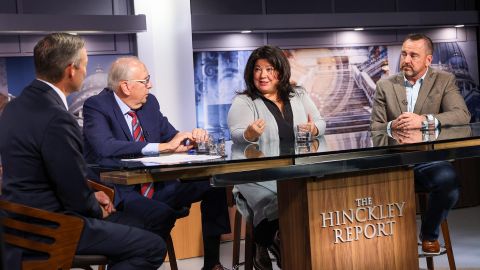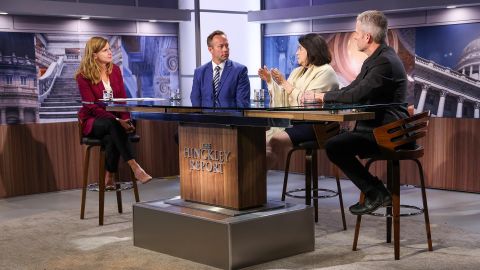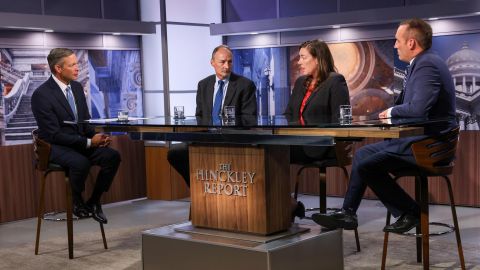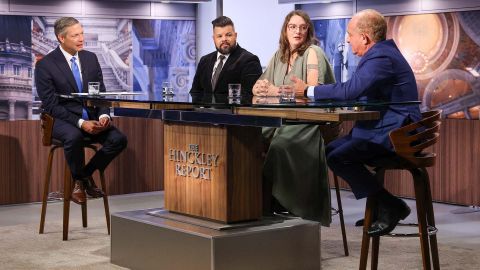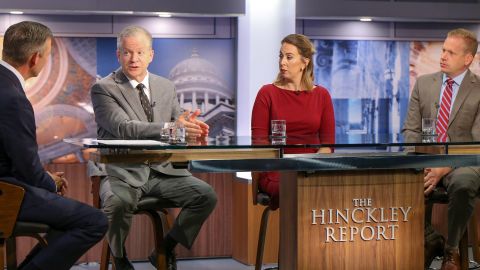(soft ethereal music) - [Announcer] Funding for "The Hinckley Report" is provided in part by the Cleone Peterson Eccles Foundation Fund, Merit Medical, and by contributions to PBS Utah from viewers like you.
Thank you.
Thank you.
- Tonight on "The Hinckley Report."
Throughout the past decade, citizen-led ballot initiatives have played a major role in Utah politics.
What part do they play in the political process?
How has their significance grown?
Who are the winners and losers?
And in what ways have they shaped state policy?
(dramatic music) (dramatic music continues) Good evening and welcome to "The Hinckley Report."
I'm Jason Perry, Director of the Hinckley Institute of Politics.
Covering the week, we have Rich McKeown, Co-Founder of Leavitt Partners, Maura Carabello, President of Exoro Group, and Marty Carpenter, Partner at Northbound Strategy.
So glad to have you on this special episode tonight because we're gonna talk about one big topic.
It's what we're talking about in the news, people are talking about it in their homes, and this is initiatives.
What about these initiatives in the state of Utah and what kind of influence are they having?
At least some of them are leading to something we'll be voting on in this November.
But really what do we know about initiatives?
You are the experts tonight.
And I wanna set the stage for us as we get into this conversation about how initiatives work, what kind of influence they have by talking where it is grounded, where it is sourced.
And that is in the Utah Constitution.
I wanna set the stage by reading that.
This is Article VI, Section 1 of the Utah Constitution to talk about our powers.
And here it is.
"The legislative power of the State "shall be vested in a Legislature "consisting of a Senate and a House of Representatives "which shall be designated "the Legislature of the State of Utah, "but the people reserve to themselves "the power to initiate any desired legislation "and to require the Legislature "to submit any law passed by it to a vote of the people, "as provided in this section."
Maura, we're gonna start with you.
This is the foundational principle right here that gives sort of this idea.
Is there coequal power between our representatives and the people?
- Right, let's stay historical for a second.
At one point in my life, I was the Director of the Centennial Commission.
And what we know about ballot measures, the right of the people, is that it was about four years after statehood that it was put into our constitution.
And at the time there was only one other state that had this right.
And the other state had rights like we're contemplating now, which is limited rights.
And they looked at those choices and they said, "We don't want that.
"We sort of want it written "so that the people can directly have also coequal power "to put into law things that they think "that their representational government "is not putting into place."
So we're one of the longest serving states to have this in our constitution.
So this sets the stage for now what has become the push and pull of, okay, you have this right, but how hard is it to get on?
And the qualifications to get on a ballot is completely up to the discretion of the legislature.
And then Amendment D that we're talking so much about now also brings into question, what can the legislature do if and when this is passed?
So those are two very different discussions.
How hard is it to get on, and then, when something is passed by the folks, what can the legislature do with that law?
- It's worth noting that only like 21 states in the country actually have this element into their process where citizens can run an initiative and have sort of that somewhat equal power in the process.
The other thing that's interesting about that being in the constitution is, remember, that legislature is elected by the people, and it's done in a way where we have representatives from each little part of the state.
So we get representation across the state.
It gives us something more like a republic, instead of an initiative which ends up being like a straight democratic vote.
Does it have to pass by 50%?
- That's what so important is, when the state was founded, they knew this, right?
They knew they had legislators, they had the knowledge that you had representational government.
With that knowledge, they said, "Wait a minute.
"The people themselves also need the right "to check their representatives."
- Talk about this tension.
Please, Rich.
I was just gonna say, if the question is, are they co-equal or not?
The answer is it's an evolution.
I mean, that is what constitutional law is all about.
You have a constitution, and it's tested constantly.
It's been tested recently and over the course of time and in terms of many of the capacities that relate to it.
So it's an evolution, and the courts are the check on the legislature.
And that's the way that it works and it's the way that the legislature then can respond.
And then often when the courts act, they invite the legislature to say, "This is within the purview of the legislature.
"Do what you're supposed to do."
- Talk about sort of the tension that exists within that statement itself.
'Cause you've been directly involved in at least one of those where you have this direct democracy where you have people coming direct to the legislature and the legislature trying to represent.
Inherent in that, is there a tension?
Is that what we're seeing represented in this evolution that you talked about?
- There's a tension because you cannot sometimes get the legislature to do the things that you would like them to do.
We in 2009 began a process of meeting with parties and with the legislative leadership to try to change the way that one could get on the ballot to include a signature pathway.
There was a lot of discussion, but it was unproductive and it led to an initiative.
And initiatives are hard, and they ought to be hard, because legislation is hard to pass and they ought to be well thought out.
I think that's the tension that exists with regards to the public.
- I wanna get to that very example 'cause you were involved in that, was the Count My Vote initiative, and we'll talk about what happened after that.
But since you brought it up, let's talk about some of the requirements for just a minute.
Because is it supposed to be hard, and is it hard?
Marty, is it hard, is it too hard?
Talk about some of the requirements that are at play to get an initiative going forward.
- Too hard is a matter of opinion.
Is it difficult?
That's a matter of fact.
Yeah, it is a challenge to do it.
And it's supposed to be, right?
It's supposed to be.
I think it's designed that way to make sure that we have this balance struck between, for the most part, the people who are elected as representatives of the people are the ones who are supposed to study out the issues, understand the issues, and go ahead and move legislation forward in a way where they can see the full chess board and how every decision impacts other pieces of law in the code, right?
But you have to have the balance on that where the people can say, "Hey, this one's actually really important to us, "and we actually want you to act on this."
The push and pull we're getting into in this election cycle is, once the people have spoken, how does the legislature then adjust that to do what they do on their side, which is make it fit with everything else that's in the process?
- Speaking of how hard it is to get on, I would sort of come to this as a practitioner.
I've, for better or worse, probably done more ballot measures than anyone in the state.
I've probably talked to about 15 serious organized groups who want to do this.
Of that, only five of them have even made an attempt to get on.
And many of them were successful, but they brokered a deal prior.
And of those, only three were on, and of those, only one passed.
So the notion that we are just open.
But in the course of those 20 years, the legislature probably a half a dozen times has tested the onus and tweaked it.
Notably, every time an initiative is remotely successful, you can be sure the call-and-response of the legislature is to add more details.
Here's my challenge with things becoming harder.
When things get harder, you hire professionals.
That's just the reality of politic.
And it gets further away from a citizens movement because you need experience to navigate.
There are 16 individual steps to get on the ballot.
It requires 134,000 plus signatures right now distributed in 26 of our 29 counties.
It has measures that the legislature has actually taken off for themselves.
So it requires a fiscal analysis note, it requires noting specifically what are the taxes.
Interestingly enough, the legislature said several years ago, "We don't need that for us."
It requires a drafting attorney.
It has to not offend the constitution.
It has an accuracy test.
It has 16 different really onerous steps, down to the color of the paper you copy on, where you put the staples on.
One thing we all agree is it should be hard to get on the ballot.
I think everybody, those of you who have lived in states that have a really easy ballot process, you could be voting on 10 or 15 issues.
I don't think that's healthy for policy.
But that's the question.
Process, I think, is where you look when you say, "Do we have coequal power?"
- And by the time it gets there for a voter, you get a yes or no question on a ballot.
And that's what's really tough is all of the negotiation, all of the policy work has supposedly gone in beforehand and then you're met with yes or no on this.
And anyone who's taken a political poll has probably felt that frustration of, are you in favor of this or not in favor of this?
And you go, "Well, I guess I'd say yes, "but I don't know."
- But there are safeguards in place when the citizen initiates it.
One, it can only be single issue.
This is a stroke of brilliance.
Because you can't pile it on.
For example, like a constitutional amendment offered by the legislature, which is often multiple issues, making it very hard to discern.
So single issue, the legislative council looks at the drafting.
Those are all in an attempt to make it easy for people to decide intuitively where their values and views are.
- There's a big difference here between drafting legislation, though, that goes through this legislative process with lots of input.
It's an imperfect process when you craft an initiative.
And if we are stuck with the language of an initiative forever, we probably are going to have a problem.
I think that's one of the issues that's at stake here is how much legislative input can then come after an initiative is passed.
And I think that's the collision that the courts and the legislature are going to wrestle with.
- So what conclusion have you come to on that?
Because you've helped draft, you've drafted an initiative before.
And so this principle you talked about is, once you put forth the language, that's your language.
But at the heart of what we've been talking about, this Amendment D is what you're referring to, is whether or not it is set in stone forever.
As someone who's drafted one of these things, how are you reconciling sort of the language itself going forward with the need to change?
- So talk process for a moment.
I think that it's absolutely essential that we have the capacity to tweak, amend, and to change the language to make it more compatible.
I think at issue is how far you can go in that, in changing the principle that underlies the initiative itself.
Conceptually, all of us who I think have dealt with this realize the need to be able to change as times change and as the circumstances change.
So that's what I think is the issue at stake here.
- But my reading of current law is that amending is allowed.
What the new proposal is is to put the word repeal in.
The novelty of this is that they could repeal.
They currently, they being the legislature, actually has the right to amend, and they've exercised that right.
Medicaid expansion I ran, and they amended that, and there was no contesting of that.
- Briefly, how'd that happen?
Because there's a percentage?
- Yeah, and in that we in concert drafted actually with legislators, and we consulted the private sector.
And I would stand up that drafting process.
What I know about bill drafting.
I've worked with legislators and I've worked with initiatives.
Bill drafting is a product of the person, not the process.
I have had horribly written bills by legislators who paid no attention and actually didn't know the content of their bill.
I've had legislators who have gone through amendments, like public comment periods and everything.
Well, the input process is actually more restrictive for ballot measures.
You can be a less bad actor there.
So I like that.
I like that it forces proposals.
But right now they have the ability to mend.
What's new in this is, can they wholesale repeal?
- But the drafting process, I think, is really essential here in terms of the ability to kind of work our way through it.
I agree that this case itself talks about the ability to tweak and amend without circumventing the principle of it.
And I think that's an important concept here.
I really do.
That's one of the things at issue.
- I think what's of concern though on the Hill right now, and a lot of this relates to what's going on or what has gone on with Amendment D, is yeah, you're right in the process, like let's have a process where the people can have their voice heard.
And we've always had a way where the legislature can go, and then, as Rich put it, tweak it, amend it, make it fit within the rest of the state law so that we understood what you're trying to accomplish.
Here's how we're gonna make it fit.
With the ruling that we got from the district court on Amendment D, it put in this idea, or actually it was on the Supreme Court side before that, on the Alter and Reform Government.
And that's where there's some ambiguity.
Nobody really seems to know on the Hill or around the policy circles in our state what exactly constitutes alter and reform the government.
Is changing a simple law alter and reform, or is that changing the structure?
And it's that ambiguity, I think, that has a lot of people going, "We're not sure what this means."
- The only people that I have met who have ambiguity have not taken the time to read the very long 84 pages that the Supreme Court put out.
My point in the 84 is it's actually not ambiguous.
It's very clear.
And it's plain spoken in its contextualization of a single type of issue, which is to reform your government.
It sets aside all common other processes.
And it says to reform your government, and it reasserts there that the legislature must have the power to amend.
We all know that amendment is so important because they get out of form.
A classic example of this was brought up on the debate floor during the amendment in which one of the representatives reminded us that we passed what was colloquial called English Only.
And during COVID we had to print some things in Spanish.
So the right to amend.
If someone's selling you, I think, that too hard, they have not read what the justices wrote.
The legislative body has to continue to progress and change over the decades law that's in place.
This was specific to you disregarding the will of the people.
- One of the issues there too is, you mentioned the Medicare/Medicaid expansion.
The idea that that was negotiated is really the appropriate way for these to move forward.
That is essentially what happened with Count My Vote.
So we started an initiative, and, ultimately, I mean, you were involved in this with us, and as it progressed and as it began to look like we were going to get the number of signatures necessary to get on the ballot, the legislature approached us and we sat down and we negotiated a resolution.
It's not perfect.
It needs change and tweaking now.
But, nonetheless, I think it came to a resolution in a way that is appropriate for the legislature and initiatives to work together.
- I love that point because one of the tests I would have if I were at a citizen is, did the initiative sponsor first attempt to try and work something out with the legislature?
In my experience, we've never had a ballot measure that has never tried to have the conversation.
But that's a really important point.
If you're a citizens group and the legislature's not doing what you want, you gotta give 'em a couple of goes.
Like first try and do standard process.
- Rich, will you give us the insider's take on this a little bit too?
Because you put this forward.
Did you feel like you had the conversations, you were left with no alternative?
And once you did do that, how did that conversation start, and why did you feel at the time like what I'll do is negotiate here on this language?
- Ours was a question of having had the discussions previously and having no consequence to it.
And feeling a necessity, we had to create an initiative.
We just felt strongly that there needed to be an alternative path to the ballot.
And it was focused considerably on the lack of voter turnout.
We had become a very desperate state in that regard.
But the bottom line is that, in moving this through, when we finally got to the point that it appeared that we were going to have enough signatures to get this on the ballot, it was what I think sparked the legislature to reach out to us.
And we were prepared to have conversations at any point in time, and they did.
We sat down, we began to work our way through it.
It took a lot of wrestling and some hung-up phone calls where things didn't quite initially come together.
But it was a process not unlike a legislative process to bring different minds together and try to fashion something that would work.
- Interesting.
Go ahead, Marty.
- That's usually been our key to success in the state, right?
Is that ultimately we are, I would say better, than most other states in this union at putting the right people at the table to come to some kind of consensus.
It's been a hallmark for us throughout most of our state's history and certainly over the last 30 years or so that we've been able to do that.
That doesn't mean we always started very close, it doesn't mean everybody got what they wanted.
Usually, the best negotiations end where everyone got something they wanted and everyone gave on something that they didn't want to give on.
- So, Marty, I completely agree with that, but I wanna speak for the power base and the people who maybe aren't in it, of which there are a third of Utahans if not more.
And the challenge with the supermajority, regardless of their political ideology, it has nothing to do with the political spectrum, but supermajorities may be benevolent and invite people to the table.
And that's where most of Utah lawmakers have been.
But it's an act of benevolence.
Because you actually don't have the power to petition and move a supermajority in the legislature.
If those 61 Republicans in the House aren't buying what you're selling or their caucus holds close, which was I think the dynamic of Count My Vote... Count My Vote had many supporters, but they couldn't find the politic in the caucus to pass that legislation.
So then it becomes really key to pose an alternative that is likely in agreement with most of the legislators.
But, frankly, politics matters, and sometimes the politics in a supermajority don't reflect the will of the people.
They often don't reflect the will of individual legislators.
So this option of going to another system that would allow someone's voice who was left out of the seat or didn't get the resolution that they want, that's why coequal balance matters.
- I agree 100% with that.
That's what I'm saying is that the citizens having the ability to initiate the process as a way of saying, "Here's where we are on it."
And I think most of us agree that they want to show you what their will is, but then when we get into the details, let's let the folks who are actually elected to get into those details figure out how to make it work.
And that's where I think we've been, arguably could say that's the crux of the problem was we felt like there's an imbalance there.
- I know I'm super argumentative all the time on initiatives.
- You're a leader.
- One of the things that I sort of, I think is a disconnect is when I hear people say, "Well, let those elected, let the specialists do it."
Let us remember that on purpose we have a lay legislature, on purpose, we have less than full time, on purpose, we say, "This isn't your day job.
"You're gonna be a man of the people "and you're going to come."
They develop histories, they have access to huge expertise.
They have a number of advantages that should be honored because citizens don't often have those access to resources.
But they are not full-time legislators.
They are often not knowledgeable about the issues that they're tackling.
So I think this elevation that they somehow make better decisions inherently, no, absolutely better access to information.
But I take a little bit of umbrage in saying that I as a citizen do not understand and don't have the capacity that someone... You didn't say that.
- I wouldn't say you as a citizen don't, but I'd say you plus 1.6 million other voters may not have same role.
- Hey, they're the ones that put these guys in.
- That's true.
- There are two pieces to this, but I wanna get to this one right here.
And it's a comment from the legislator and elected officials.
At least one of the parts of these points that you just made is this.
They keep saying, these are decision makers, "We don't want to be the state of California."
We've heard that time and time again.
What does that mean when they're saying something like that?
'Cause it does get to the heart of what we're just talking about now.
- Well, I think that, you know, initially at least, California's process has invited a lot of initiatives, and they plug up the legislature in the sense that the general allocation of funds when they are solidified in these initiatives, they give less flexibility to the legislature relative to the utilization of the general fund.
I think that is a big pressure point.
- So the use of the term, "We don't wanna be like California," I think it's brilliant.
Because what it is is a political trope.
And as someone who does campaigns with Marty, like I will embrace my role in the process.
But all this is is a trope.
We say we don't wanna be like California.
Like that's just good old fashioned political equity there.
So the legislation they're speaking of has nothing to do with how hard it is to get on the ballot, with the exception of the foreign powers, so decreasing the ability to put money into the system.
But it has nothing to do with the amendment.
They're throwing it out there.
It's what would be called a dog whistle so that we say, "We don't wanna be like California."
The plain reading of this legislation does not speak to making it harder to get on the ballot.
No one wants to be like California.
That's why they're using this.
In practice, we are so far away.
I mean, there is not a chance knowing how hard it is to get on the ballot.
My advice to most people who come to me and ask if they should do a ballot measure is no.
It's so hard, it's so hard.
- I don't think it's about getting on the ballot so much as it's the tug and pull of how do we have the ability to amend it after.
In California, a lot of these, they get an initiative passed and then it can only be changed by initiative.
So every time people have seen video of people going in, organized retail crime going in and looting a store and running out, it's because there was an initiative passed in California that says, "Hey, it's not a felony "if it's only $900 in theft or lower."
It's caused huge problems for business, for the economy, for the reputation of the state of California, and their only way to go fix it is to go pass another initiative.
So they have the other big heavy lift to go fix it as opposed to having a way to just tweak it and say, "Hey, this isn't working for us "the way we thought it was going to.
"Let's change it."
That I think is where most of the people on the Hill right now would say, "As long as we have the ability to go make it work."
- [Maura] Which they do.
- Yes, well.
- They currently have the ability to amend.
- But I don't know that you get 100% agreement with that's how people are reading it up there.
And so that's why there's the concern.
- They should talk to their legal counsel.
- Just talk to Maura.
- I was gonna say maybe I'm on the lunatic fringe, but we actually ran the Count My Vote initiative twice.
Which succeeded in the second one except by virtue of the removal we did.
We've been involved in litigation, we've had... - [Jason] Well, maybe you should explain that just a tad because this is part of the process.
- It is part of the process.
One of the things that is in the legislation is that permission of, after the process, and I guess now during the process, people are allowed to go to those who signed the initiative and have their names removed.
And it was thought to be strategically impossible, I think, at one time.
But when Pick Out My Vote got enough signatures to be on the ballot, there was a 30-day window of time during that period of time that they could go and remove people.
They surgically removed about 2,700 people, and it voided our capacity to be on the ballot.
- Maura, you're so close, can you just give us the kind of 30-second primer on that?
Because you have to have the right number of signatures and the right number of counties.
And it is possible to get that list and go and get people take their name off.
- This is a distribution question.
And this is something that has changed over time, and, in fact, what Rich is referring to is the first Count My Vote, and then the legislature changed the requirements around taking your name off.
It's a great idea to be able to say, "Oh, I didn't know what I was signing."
But here's how hard this is.
To our friends in Piute, in Duchesne in the wintertime, because that's the window that you have to signature gather.
You are going house by house, you are gathering, and let's say in your county you need 600 signatures.
The sponsor is responsible for 600 plus a buffer, plus making sure you have some wiggle room.
The person rescinding it is only responsible for taking off 50.
I mean, you don't have to take off, obviously.
You just have to get below the threshold.
And that is, again, because not only do you have to have volume, you have to have distribution.
Distribution is 26 of 29.
So most strategists tell you now to gather and meet it in 27 counties or senate districts or maybe even 28.
- 8% of the vote in the last presidential election in that district.
- Distributed, yeah.
It's super tough.
- It's hard.
- Marty, in our last 30 seconds, where are initiatives going here?
What do you see based on this lawsuit, decisions, and the legislature?
- I mean, if I had a crystal ball, it'd be great.
I'd make more money betting on sports than I would gambling on a question like that.
You know, I think at the very least, the way the conversation has gone, it has invited more initiatives to be run and probably for more outside money to come in and at least test to see whether Maura's legal theory is right or whether a lot of folks on the Hill who think, "Hey, this is gonna turn us into California "with more governance by initiative" is the way it goes.
But at the very least, the idea that there's that vulnerability invites bigger outside money to come in and at least test the defenses of the state that's kept us from being California for so long.
- The last comment today.
This is so insightful.
We know it better, and we appreciate your words of wisdom on this.
And we appreciate you watching "The Hinckley Report."
This show is also available as a podcast on pbsutah.org, YouTube, or wherever you get your podcasts.
Thank you for being with us.
We'll see you next week.
- [Announcer] Funding for "The Hinckley Report" is provided in part by the Cleone Peterson Eccles Foundation Fund, Merit Medical, and by contributions to PBS Utah from viewers like you.
Thank you.
(uplifting music)

